Public Member Functions | |
| None | __init__ (self, bool isolated, Optional[Kind] load_only=None) |
| None | load (self) |
| Optional[str] | get_file_to_edit (self) |
| Iterable[Tuple[str, Any]] | items (self) |
| Any | get_value (self, str key) |
| None | set_value (self, str key, Any value) |
| None | unset_value (self, str key) |
| None | save (self) |
| Iterable[Tuple[str, str]] | get_environ_vars (self) |
| Iterable[Tuple[Kind, List[str]]] | iter_config_files (self) |
| Dict[str, Any] | get_values_in_config (self, Kind variant) |
| str | __repr__ (self) |
Data Fields | |
| isolated | |
| load_only | |
Protected Member Functions | |
| None | _ensure_have_load_only (self) |
| Dict[str, Any] | _dictionary (self) |
| None | _load_config_files (self) |
| RawConfigParser | _load_file (self, Kind variant, str fname) |
| RawConfigParser | _construct_parser (self, str fname) |
| None | _load_environment_vars (self) |
| Dict[str, Any] | _normalized_keys (self, str section, Iterable[Tuple[str, Any]] items) |
| Tuple[str, RawConfigParser] | _get_parser_to_modify (self) |
| None | _mark_as_modified (self, str fname, RawConfigParser parser) |
Detailed Description
Handles management of configuration. Provides an interface to accessing and managing configuration files. This class converts provides an API that takes "section.key-name" style keys and stores the value associated with it as "key-name" under the section "section". This allows for a clean interface wherein the both the section and the key-name are preserved in an easy to manage form in the configuration files and the data stored is also nice.
Definition at line 87 of file configuration.py.
Constructor & Destructor Documentation
◆ __init__()
Definition at line 101 of file configuration.py.
References Configuration.__init__(), and i.
Referenced by Configuration.__init__(), and Protocol.__init_subclass__().


Member Function Documentation
◆ __repr__()
| str __repr__ | ( | self | ) |
Definition at line 380 of file configuration.py.
◆ _construct_parser()
|
protected |
Definition at line 277 of file configuration.py.
References i.
Referenced by Configuration._load_file().

◆ _dictionary()
|
protected |
A dictionary representing the loaded configuration.
Definition at line 233 of file configuration.py.
References i.
Referenced by Configuration.get_value(), and Configuration.items().
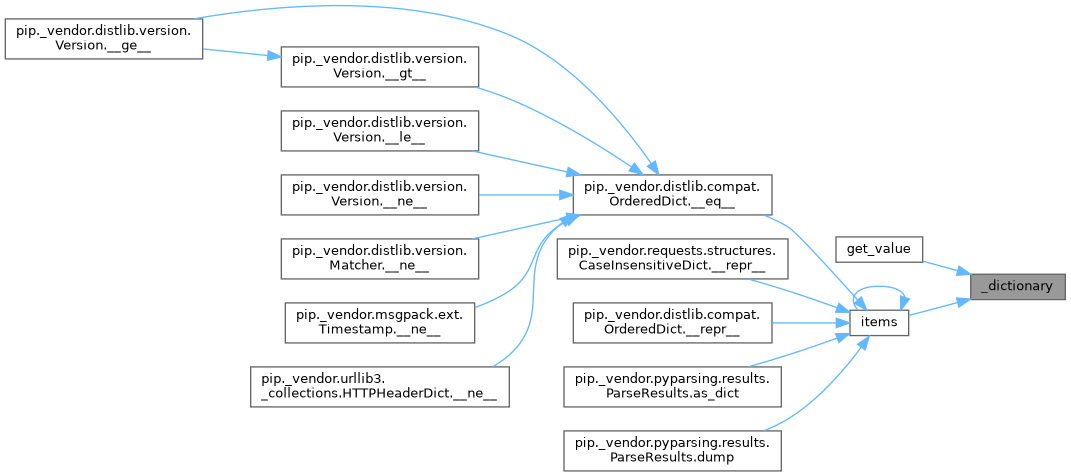
◆ _ensure_have_load_only()
|
protected |
Definition at line 227 of file configuration.py.
References i, and Configuration.load_only.
Referenced by Configuration.save(), Configuration.set_value(), and Configuration.unset_value().

◆ _get_parser_to_modify()
|
protected |
Definition at line 361 of file configuration.py.
References Configuration.load_only.
Referenced by Configuration.get_file_to_edit(), Configuration.set_value(), and Configuration.unset_value().
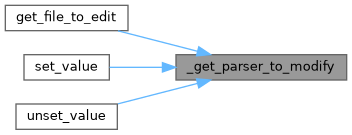
◆ _load_config_files()
|
protected |
Loads configuration from configuration files
Definition at line 244 of file configuration.py.
References Configuration._load_file(), i, Configuration.iter_config_files(), and Configuration.load_only.
Referenced by Configuration.load().


◆ _load_environment_vars()
|
protected |
Loads configuration from environment variables
Definition at line 298 of file configuration.py.
References Configuration._normalized_keys(), Configuration.get_environ_vars(), and i.
Referenced by Configuration.load().


◆ _load_file()
|
protected |
Definition at line 267 of file configuration.py.
References Configuration._construct_parser(), Configuration._normalized_keys(), and i.
Referenced by Configuration._load_config_files().


◆ _mark_as_modified()
|
protected |
Definition at line 375 of file configuration.py.
Referenced by Configuration.set_value(), and Configuration.unset_value().

◆ _normalized_keys()
|
protected |
Normalizes items to construct a dictionary with normalized keys. This routine is where the names become keys and are made the same regardless of source - configuration files or environment.
Definition at line 304 of file configuration.py.
References pip._internal.configuration._normalize_name().
Referenced by Configuration._load_environment_vars(), and Configuration._load_file().


◆ get_environ_vars()
| Iterable[Tuple[str, str]] get_environ_vars | ( | self | ) |
Returns a generator with all environmental vars with prefix PIP_
Definition at line 318 of file configuration.py.
References i.
Referenced by Configuration._load_environment_vars().

◆ get_file_to_edit()
| Optional[str] get_file_to_edit | ( | self | ) |
Returns the file with highest priority in configuration
Definition at line 128 of file configuration.py.
References Configuration._get_parser_to_modify(), and Configuration.load_only.

◆ get_value()
| Any get_value | ( | self, | |
| str | key | ||
| ) |
Get a value from the configuration.
Definition at line 143 of file configuration.py.
References Configuration._dictionary(), pip._internal.configuration._disassemble_key(), and pip._internal.configuration._normalize_name().
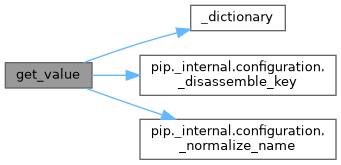
◆ get_values_in_config()
| Dict[str, Any] get_values_in_config | ( | self, | |
| Kind | variant | ||
| ) |
Get values present in a config file
Definition at line 357 of file configuration.py.
◆ items()
| Iterable[Tuple[str, Any]] items | ( | self | ) |
Returns key-value pairs like dict.items() representing the loaded configuration
Definition at line 137 of file configuration.py.
References Configuration._dictionary(), and Configuration.items().
Referenced by OrderedDict.__eq__(), CaseInsensitiveDict.__repr__(), OrderedDict.__repr__(), ParseResults.as_dict(), ParseResults.dump(), and Configuration.items().

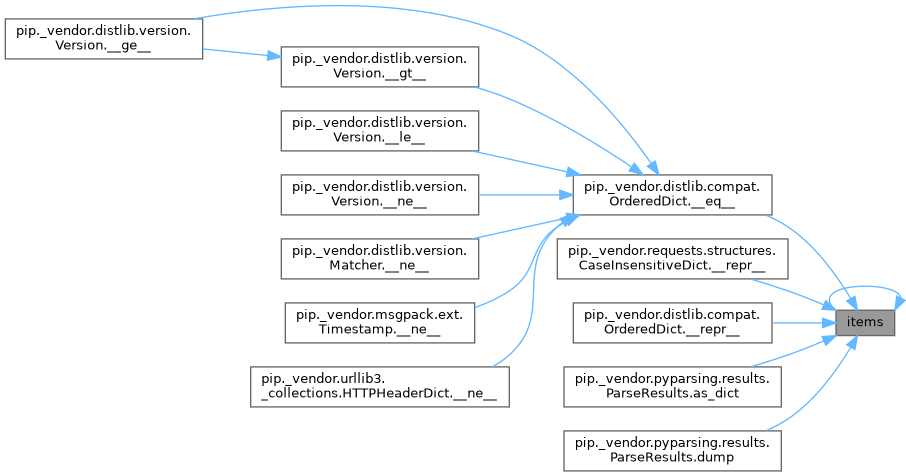
◆ iter_config_files()
| Iterable[Tuple[Kind, List[str]]] iter_config_files | ( | self | ) |
Yields variant and configuration files associated with it. This should be treated like items of a dictionary.
Definition at line 327 of file configuration.py.
References pip._internal.configuration.get_configuration_files(), i, Configuration.isolated, and InstallRequirement.isolated.
Referenced by Configuration._load_config_files().


◆ load()
| None load | ( | self | ) |
Loads configuration from configuration files and environment
Definition at line 122 of file configuration.py.
References Configuration._load_config_files(), Configuration._load_environment_vars(), Configuration.isolated, and InstallRequirement.isolated.

◆ save()
| None save | ( | self | ) |
Save the current in-memory state.
Definition at line 203 of file configuration.py.
References Configuration._ensure_have_load_only(), and i.
Referenced by pyparsing_test.reset_pyparsing_context.__enter__().


◆ set_value()
| None set_value | ( | self, | |
| str | key, | ||
| Any | value | ||
| ) |
Modify a value in the configuration.
Definition at line 155 of file configuration.py.
References pip._internal.configuration._disassemble_key(), Configuration._ensure_have_load_only(), Configuration._get_parser_to_modify(), Configuration._mark_as_modified(), pip._internal.configuration._normalize_name(), i, and Configuration.load_only.
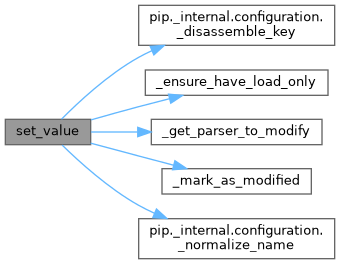
◆ unset_value()
| None unset_value | ( | self, | |
| str | key | ||
| ) |
Unset a value in the configuration.
Definition at line 174 of file configuration.py.
References pip._internal.configuration._disassemble_key(), Configuration._ensure_have_load_only(), Configuration._get_parser_to_modify(), Configuration._mark_as_modified(), pip._internal.configuration._normalize_name(), i, and Configuration.load_only.
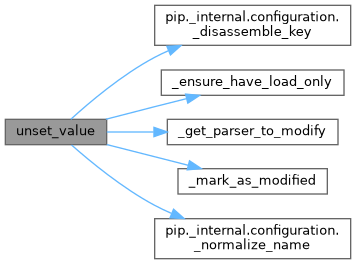
Field Documentation
◆ isolated
| isolated |
Definition at line 110 of file configuration.py.
Referenced by InstallRequirement.install(), Configuration.iter_config_files(), and Configuration.load().
◆ load_only
| load_only |
Definition at line 111 of file configuration.py.
Referenced by Configuration._ensure_have_load_only(), Configuration._get_parser_to_modify(), Configuration._load_config_files(), Configuration.get_file_to_edit(), Configuration.set_value(), and Configuration.unset_value().
The documentation for this class was generated from the following file:
- /home/liwuen/projects_dev/pqc-engineering-ssec-23/venv/lib/python3.12/site-packages/pip/_internal/configuration.py